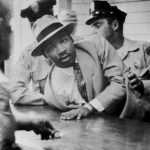Standing in Solidarity with friends of Trayvon Martin
I was recently invited to the White House for a ceremony to commemorate the life and work of Mexican-American farmworker and civil rights leader, Cesar Chavez. In 1965, Chavez and the United Farmworkers Union began a boycott of table grapes to protest the abuse of working conditions and wages of farmworkers. The strike lasted for five years and brought great relief to thousands of laborers as well as more just working conditions.
On many occasions, I have reflected on the decision I made shortly after becoming a serious follower of Christ to stop eating grapes, as a way to remember and identify with the struggle of the poor and vulnerable in this country. The more I learned about the plight of mostly Mexican farmworkers, the more I felt compelled to do something to enter the struggle for justice.
Little did I know back in 1976, that my entire adult life would be spent living and working in under-resourced neighborhoods seeking to be an agent of God’s love, reconciliation and justice. That small step I took as a high school student to stop eating table grapes became an important launching point for me and something that I still practice today.
On Sunday morning, I wore my CCDA hoodie to church. Like many ministers across the country, I responded to a call to wear a hoodie as a sign of solidarity with our young people to protest the shooting of Trayvon Martin. The news of an unarmed young man clutching Skittles and wearing a gray hoodie, getting gunned down in what many believe was a racially-motivated act of violence broke my heart. There have been 100 man marches in hoodies, a call for a million man march in hoodies, and various sports teams, celebrities, and clergy all donning their hoodies because of a deep conviction that we must do something to address this senseless murder, with all of its undertones.
Like many Americans, I was particularly moved when I heard that President Obama had addressed the situation by stating that if he had a son, he would probably look like Trayvon Martin. What I loved about the President’s empathetic response was that it served as a reminder that the wellbeing of all children in every community should be our collective concern—especially for Christ-followers who should be filled with the love of God.
Finally, as a man of Latino descent, I lament that it was a young man of some Latino background that gunned down Trayvon. I mourn for his family. I mourn for our country. And I pray that the outcry and concern that so many of us are feeling today would not fade away but lead us rather to sustained action, prayer and involvement in the work of racial and class reconciliation.
I invite our entire CCDA family to find some way to lean into the pain that is surfacing in communities across our country because of violence and racial strife.
“Blessed are those who mourn, for they will be comforted.” [Jesus from the ‘hood of Nazareth]





